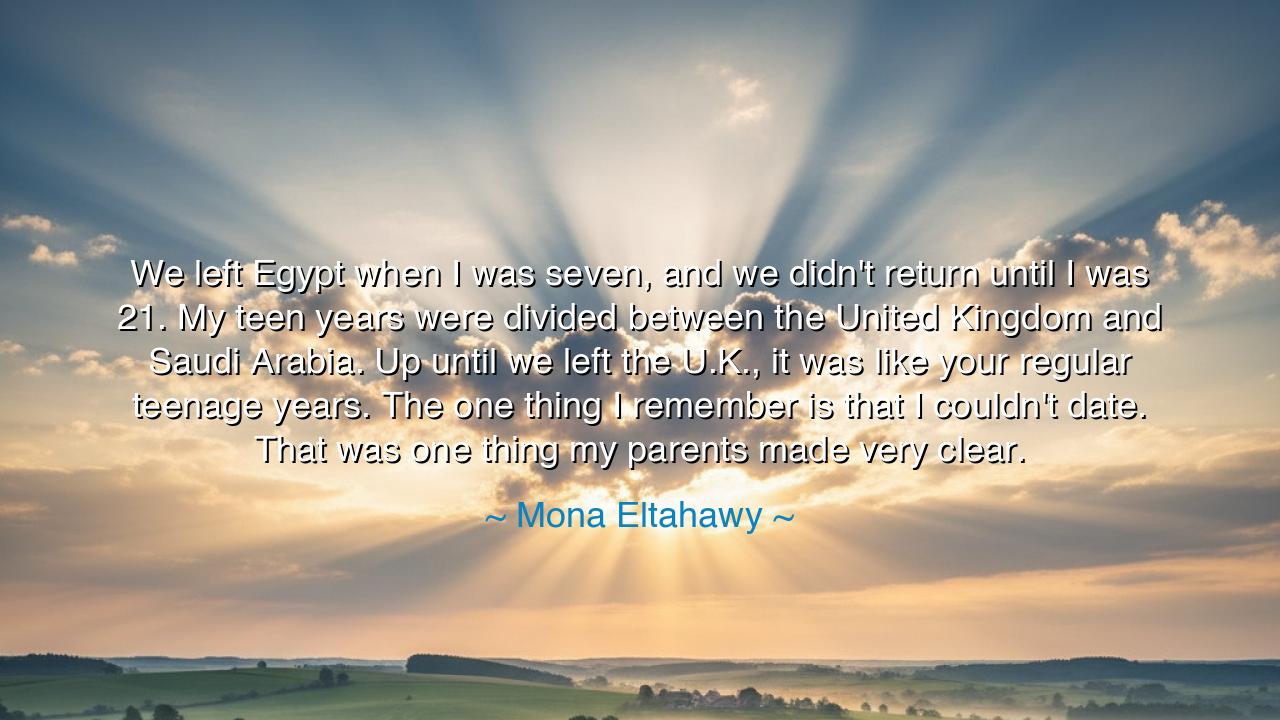
We left Egypt when I was seven, and we didn't return until I was
We left Egypt when I was seven, and we didn't return until I was 21. My teen years were divided between the United Kingdom and Saudi Arabia. Up until we left the U.K., it was like your regular teenage years. The one thing I remember is that I couldn't date. That was one thing my parents made very clear.






When Mona Eltahawy reflected, “We left Egypt when I was seven, and we didn’t return until I was 21. My teen years were divided between the United Kingdom and Saudi Arabia. Up until we left the U.K., it was like your regular teenage years. The one thing I remember is that I couldn’t date. That was one thing my parents made very clear,” she spoke not only of her own life but of the eternal struggle between freedom and boundary, culture and tradition, selfhood and authority. Her words are filled with the weight of exile, of movement between worlds, and of the restrictions that shaped her becoming.
The origin of this truth is in migration, the story of leaving and returning. To depart from one’s homeland at the age of seven is to carry it as memory rather than daily reality. And when the years of adolescence—the most formative of years—are lived in foreign lands, the soul is shaped by many forces at once. Eltahawy’s teen years were not only about music, school, and friendships, but also about the constant negotiation of identity: Egyptian, British, Saudi, and yet uniquely herself. This division between cultures is both a gift and a burden—offering wide horizons, but also forging an inner tension between freedom and restraint.
Her memory of the United Kingdom carries the taste of ordinary adolescence, the rhythm of “regular teenage years.” But when her life shifted to Saudi Arabia, her path was marked by rules far stricter, boundaries drawn more firmly. And above all, the one rule that remained clear was the prohibition against dating, the parental voice echoing louder than the desires of youth. This detail, while simple, reveals the greater struggle: the collision between a young person’s longing to explore love and identity, and the cultural and familial forces that seek to protect, control, or restrain.
History is filled with such struggles. Consider the life of Malala Yousafzai, who, as a teenager in Pakistan, longed to pursue education but was confronted by a system that denied her that right. Her youth was split between ordinary joys and extraordinary restrictions, just as Eltahawy’s was shaped by movement between freedom in the West and constraint in the East. These stories remind us that adolescence is not merely personal—it is political, cultural, and spiritual, formed by the landscapes and rules in which one lives.
The deeper meaning of Eltahawy’s reflection is that adolescence, though universal, is never the same everywhere. The teen years are marked by longing, curiosity, and the testing of boundaries. Yet those boundaries vary across cultures—what is ordinary in one place may be forbidden in another. Her story teaches us that the journey of selfhood is never lived in isolation; it is always entangled with family, culture, and geography. And yet, within these limits, the young spirit still finds ways to grow, to dream, and to resist.
The lesson here is profound: freedom must always be cherished, but restrictions must also be understood. We are shaped both by what we are allowed to do and by what we are forbidden to do. Sometimes, the walls placed around us in youth become the very forces that drive us to break them down later. For those who feel restricted, know that these constraints need not extinguish your fire; instead, they can feed it, sharpening your resolve to live fully once freedom is within reach.
Practical wisdom follows. If you are young, remember that even within restriction, you are growing in strength. Use the years of limitation to cultivate resilience, imagination, and clarity about what you truly value. If you are a parent, remember that rules, while meant to guide, also shape identity and must be given with care. And for all of us: honor the stories of those who live between cultures, for they carry truths that enrich us all.
Thus, Mona Eltahawy’s words echo as a teaching for future generations. To leave Egypt, to grow between the United Kingdom and Saudi Arabia, to endure both the freedoms and the prohibitions of the teen years, is to be forged in the fire of contradiction. And from that fire emerges wisdom: that identity is shaped as much by what we are denied as by what we are given, and that the longing for freedom, once awakened, will never be silenced.






AAdministratorAdministrator
Welcome, honored guests. Please leave a comment, we will respond soon